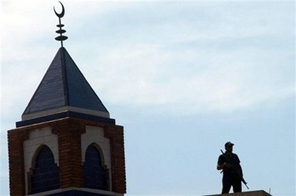At least 49 dead in Pakistan blast
PESHAWAR: A massive suicide car bomb ripped through a packed market in the Pakistani city of Peshawar on Friday, killing at least 49 people and injuring over 100 in a region beset by Taliban attacks.
The blast, which hit around midday, left charred corpses strewn in a shopping area in the city's main Khyber Bazaar, with cars reduced to burning wreckage and a colourful city bus flung on its side.
It was the sixth bombing in the northwestern city in the past four months. A minister blamed the Pakistani Taliban, who have vowed to increase attacks to avenge the killing of their leader Baitullah Mehsud in a US drone strike in August.
"We have 49 dead bodies brought to the hospital. Three of them are women and seven are children," said Doctor Zafar Iqbal, the registrar of Peshawar's main Lady Reading Hospital. All of the dead were civilians, he added.
Senior provincial minister Bashir Ahmad Bilour confirmed the death toll, saying that more than 100 people were injured in the blast. About 50 people remain in a serious condition, doctors said.
At the scene, the blackened bodies of victims lay on the street as injured shoppers in torn and blood-soaked clothing were helped from the rubble.
Passers-by desperately tried to free survivors from a city bus flung over onto its side. Flames rose from the wreckage of cars caught in the devastation. At least 12 shops were completely destroyed in the blast.
"There was blood and pieces of human body everywhere. People were crying in pain for help," said Miskeen Khan, who received shrapnel wounds to his face.
Ghulam Nabbi, a shopkeeper at the Khyber Bazaar, told AFP: "It was like somebody threw me out of my shop. For some time my mind stopped working, but then I started running to a safe place."
Police official Mohammad Karim estimated the size of the bomb at about 100 kilogrammes (220 pounds), while Shafqat Malik, chief of the bomb disposal squad, confirmed that a suicide attacker was responsible.
The device was planted in the door panels of the vehicle and included machinegun ammunition, designed to inflict maximum casualties, Malik said.
"The suicide attacker was sitting in the vehicle," he added.
There was no immediate claim of responsibility for the blast, but provincial minister Bilour blamed the Taliban.
"The target was civilians. The Taliban want to pressure government by such attacks, but we will never bow down to them. Operations will continue until the last militant is eliminated," he told AFP.
Pakistan's military is wrapping up a fierce offensive against Taliban rebels in the northwestern Swat valley launched in April, and are poised to start a new operation in the semi-autonomous tribal belt on the Afghan border.
The offensives, coupled with an increase in drone attacks by US aircraft targeting Islamists in the northwest, have provoked a furious reaction from the Taliban militia based in the tribal belt.
Despite reports of fierce infighting among the militants after the death of Baitullah Mehsud, the Taliban appear to have regrouped, analysts say, with new commander Hakimullah Mehsud keen to show his strength.
"Increasing militant attacks now reflect that they have found space to regroup and launch fresh attacks," said Ishtiaq Ahmed, an international relations professor at Islamabad's Quaid-i-Azam University.
Peshawar is the main city in the northwest and has been a frequent target of militants linked to the Taliban and Al-Qaeda.
Pakistan, on the frontline of the United States' war on Al-Qaeda, has been hit by a wave of bombings that have killed nearly 2,200 people across the nuclear-armed country over the past two years.
Friday's blast is the deadliest in Pakistan since March this year, when a suicide bomber attacked a packed mosque in the northwestern town of Jamrud at prayer time, killing around 50 people.
The Taliban claimed responsibility for a suicide attack on Monday on a UN office in Islamabad that killed five aid workers.
The latest attacks come as US President Barack Obama mulls sending extra troops to fight an increasing Taliban insurgency in neighbouring Afghanistan.






